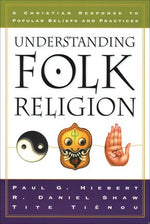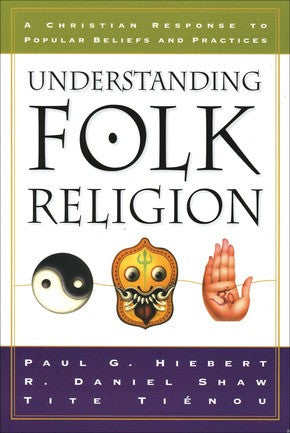- Home
- Paul Hiebert
- Understanding Folk Religion: A Christian Response to Popular Beliefs and Practices
Understanding Folk Religion: A Christian Response to Popular Beliefs and Practices
Couldn't load pickup availability
- Binding:
- Paperback
- ISBN:
- 9780801022197
- Publisher:
- Baker Academic
ISBN: 9780801022197
Type: Paperback
"A handy reference for Christian workers who are puzzled by the variety and ubiquity of folk religion and are lost in the maze of the multiplicity of Christian responses to folk religion."--Enoch Wan, International Bulletin of Missionary Research
Around the world Christian churches face the challenge of folk religions. Missionaries brought formal Christianity and assumed that traditional religions would die out as the gospel displaced animistic beliefs and practices. Today it is clear that old ways do not die out, but instead remain largely hidden from view. People affirm orthodox theologies, but go to witch doctors, shamans, diviners, and healers during the week. Christianity has become an overlay, coexisting with folk beliefs in an uneasy tension. How is the Christian church to respond?
The authors, drawing on their years of experience, both in the classroom and on the mission field, offer a compelling model that accounts for the continued persistence of folk religions. Arguing that Western missionaries have failed to take these traditions seriously, they present a richly detailed portrait of the belief systems and practices that characterize folk religions (illustrated throughout with numerous charts and examples drawn from particular cultures).
Effective evangelization requires that the message of the gospel be made relevant and understandable to a particular society. Difficulties arise when missionaries attempt either to suppress the practice of folk religions or to assimilate native rites and rituals uncritically. In neither case, do they adequately consider the importance that such beliefs and practices play in the daily lives of people.
Folk religions explain "the existential problems of everyday life" for their respective cultures. They are a social attempt to account for the problems of material existence and to exercise a degree of control over it. In particular, the authors consider four life concerns that inform the belief systems of folk religions: the threat of death, tragedies and life's misfortunes, guidance and the unknown, and the problem of right, wrong, and moral order. In each case, they consider the importance of such issues and elements that might be involved in a truly Christian response. In the final section, they offer a detailed proposal for theological and missiological responses to folk religions.
In every culture, the authors argue, successful evangelism must present a biblical response that takes account of such belief systems and the respective practices that express those beliefs. This volume provides modern missionaries with sound principles for developing a serious Christian response to prevailing folk religions.
- Weight:
- 1.5 lb




